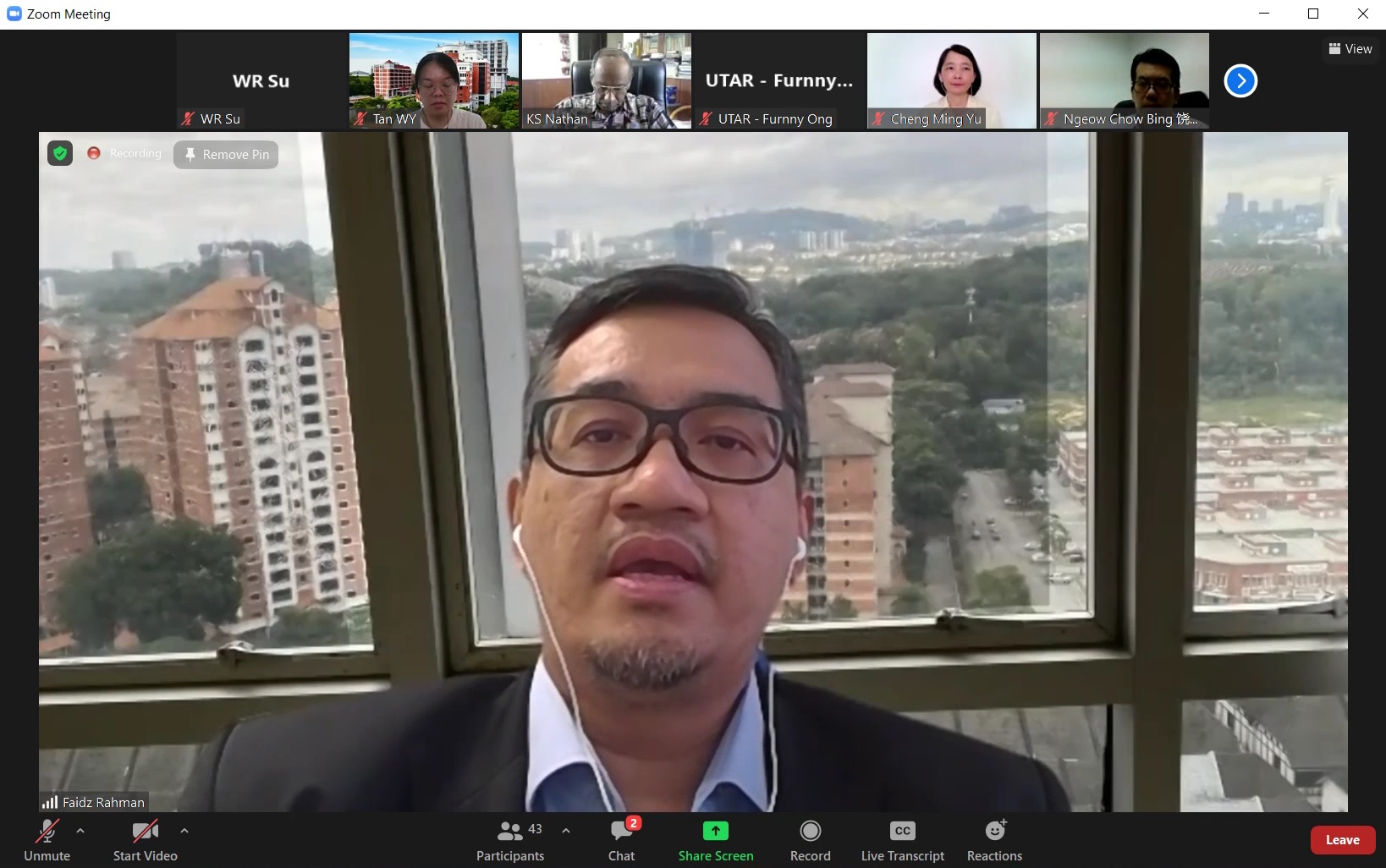
UTAR Centre for International Studies (CIS) collaborated with co-organisers UTAR Belt and Road Strategic Research Centre (BRSRC), Division of Community and International Networking (DcInterNet), University of Malaya (UM) Institute of China Studies and Malaysian Association for American Studies (MAAS) to organise a forum titled “US-China Trade War and its implications for ASEAN” via Zoom on 16 November 2021.
The panellists for the forum were MAAS President Prof K.S. Nathan,
UTAR Belt and Road Strategic Research Centre Chairperson Prof Cheng Ming Yu
and UM Institute of China Studies Director Dr Ngeow Chow Bing. The forum was
moderated by CIS Chairperson Tan Wooi Yee.

Prof Faidz delivering his speech
The forum started with a speech given by UTAR Vice President for R&D and Commercialisation Prof Ts Dr Faidz bin Abd Rahman. In his remarks, Prof Faidz first expressed his appreciation to the speakers and participants. He said, “The Covid-19 outbreak has left a significant scar on many economies but it did not stop the long-run trade war between the two powerful nations. After China economic liberalisation in 1970, China’s economy experienced a strong growth in trade and investment, which shifted the attention from the United States to China. This had led to the increased tariff rate on china exports to the United States in 2018. The new U.S. administration has maintained most of the bilateral tariff and nontariff barriers put in place by the previous administrations, continuing bilateral trade tensions between the two world’s largest economies which had significant impacts on the rest of the world.”
He shared, “Nikkei Asia reported that the 2019 growth forecast for
major ASEAN economies has been revised downwards to about 4.3%, and
economies believe that the uncertainty will continue.” He believed that the
panellists would peel and explain various layers on the discussion about the
US-China trade war for ASEAN and the world in general, and hoped that the
participants would gain insights from the webinar.




From top left, clockwise: Prof Cheng, Dr Ngeow, Prof Nathan, and
Tan
In the forum, Prof Cheng first gave an overview of the development
of US-China trade war and its impact which started in 2018. She mentioned
that the trade war was not only expanded due to the tariff but also other
aspects, such as the tech war which led to technical standard conflict. She
also mentioned that the recent major factor contributing to the trade war
was the trade deficit, explaining that the US has been using the reason for
reducing the huge trade deficit with its trading partners, China in
particular; China, meanwhile, accused the US of stealing away the jobs from
China.
She further explained the impact of tariffs. “Trade barriers will generally decrease the economic output and economic well-being, and it will result in resource allocation. The trade war happened between the two largest economies in the world, therefore the impact is far reaching due to the size and connectivity of the two economies,” she said. She also explained how the trade tensions have affected ASEAN economies differently and gave a conclusion for her presentation.
.jpg)
Prof Cheng explaining the factors that caused the trade war other
than the trade deficit
.jpg)
Statistics showed that Vietnam was the largest beneficiary of the
trade tensions
On the other hand, Dr Ngeow talked about the nature of the US-China trade war and the relationship between the two economies under the Donald Trump Presidency. He also talked about the rapid rise of China. He said, “The trade and economic issues plus the rapid emergence of Chinese enterprises as serious competitors to western enterprises.” He mentioned that China was no longer a “developing country” that enjoyed various state-backed protection. Besides, he further talked about the relationship between the two economies and the area of focus under the Biden Presidency.
.jpg)
Dr Ngeow sharing the
factors beyond trade and economic issues
.jpg)
Dr Ngeow showing the highlights of China’s foreign investment law
Moreover, Prof Nathan said the US-China trade war was a manifestation of growing power differentials between a resident power and a rising power. He mentioned that the US accused China of unfair trading practices while China believed that the US was trying to contain its rise as a global economic power. He also shared the implications of the US-China trade war on ASEAN in the aspects of politics, security and economics.
.jpg)
Prof Nathan explaining the impact of the trade war on Malaysia and
other ASEAN economies
.jpg)
Prof Nathan explaining the broader implications of the trade
conflict on the security and political dimensions, and how they impact other
dimensions such as international relations, politics and security
Wholly owned by UTAR Education Foundation mall>(200201010564(578227-M)) LEGAL STATEMENT TERM OF USAGE PRIVACY NOTICE